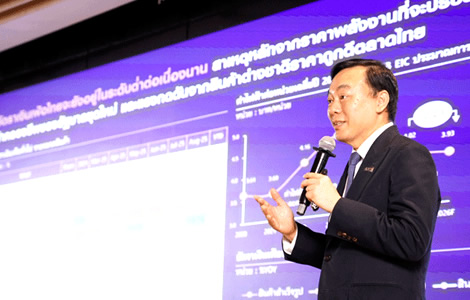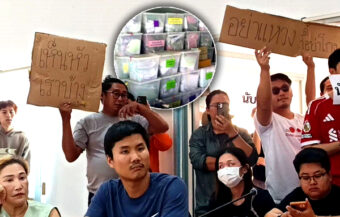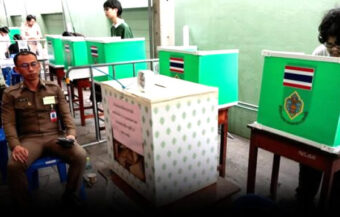Dark days loom for Thailand’s economy as GDP growth falls to 1.8%, but unemployment spikes, consumer confidence plunges, exports falter, tourism declines and fiscal pressures mount, signalling a perilous path ahead for households and businesses alike.
Warning lights are flashing for the Thai economy. The Economic Intelligence Centre (EIC) of Siam Commercial Bank still projects 1.8% GDP growth this year, but the signals are grim. Unemployment among social security workers has hit 2%, an unprecedented level for Thailand. Meanwhile, 17% of new graduates are stuck, unable to find jobs. Manufacturing barely keeps ticking over. Consumer confidence in August plunged sharply, signalling that dark days may lie ahead.

Thailand’s economy continued to struggle in August 2025, showing signs of stagnation despite isolated growth in certain sectors. The Office of Industrial Economics (OIE) reported that manufacturing activity continued to tick over, although momentum remained weak.
However, exports faced severe headwinds, particularly to the United States, where a 19% tariff and cheaper foreign competitors have curtailed market access. Meanwhile, domestic consumer confidence fell sharply, as fiscal liquidity tightened and lenders restricted credit. In addition, foreign tourism, a crucial driver of local spending, declined compared to 2024, further dampening grassroots economic activity.
Economy struggled in August as exports slowed while domestic confidence and tourism declined
Nevertheless, the Economic Intelligence Centre (EIC) of Siam Commercial Bank (SCB) maintained its GDP growth forecast at 1.8% for 2025, projecting a slowdown to 1.5% in 2026. Analysts noted that growth in the second half of this year will likely average below 1%, raising concerns over a technical recession.
Furthermore, a stronger baht and rising unemployment among new graduates, which reached nearly 17%, have intensified economic pressure. Consequently, the interim government faces mounting challenges in stabilising confidence, stimulating demand and implementing structural fiscal reforms.
Mr. Yanyong Thaicharoen, SCB EIC’s Chief Economic and Sustainability Research Officer, stated that internal and external challenges are constraining the economy. Specifically, exports, which had accelerated before U.S. tariffs, are now expected to slow significantly.
Moreover, the baht has appreciated nearly 8% this year, the strongest in four years, eliminating the competitive advantage for exporters and the tourism sector. Analysts compared the current baht value to that during the 1997 Tom Yum Kung crisis, highlighting renewed vulnerabilities.
SCB EIC warns of slowing growth with strong baht and rising graduate unemployment adding to fiscal pressures
External pressures, including a weakening U.S. dollar and increased gold trading volumes, exacerbate the situation. Although household debt has slightly decreased, it remains high. Fragile small and medium enterprises (SMEs) continue to weaken domestic consumption.
Furthermore, social security unemployment rose above 2%, while graduate unemployment surged to nearly 17–18%. High youth unemployment risks skill erosion and pushes young people into the informal economy, threatening social welfare systems.
Bank of Thailand (BOT) interest rates are expected to fall once more in December 2025 and again in 2026, possibly reaching 1%. If the economy slows further or deflation persists, additional cuts may follow.
Meanwhile, SCB EIC urged the interim government to focus on three missions, the so-called “3S” strategy: stabilise confidence, stimulate economic activity, and implement structural reforms.
Rising unemployment and household debt weigh on consumption with central bank expected to cut rates
The “Half-Half” initiative, a targeted fiscal stimulus, is set to contribute an estimated 0.1% to GDP. Although its impact is small, analysts say it is necessary to maintain momentum.
Structural reforms, particularly in fiscal policy, remain critical to secure long-term economic stability. Credit rating agencies continue to scrutinise Thailand’s fiscal framework, emphasising the need for transparent revenue and expenditure plans.
Swift disbursement of budgets and strategic investment, particularly within the government’s first four months, will be essential to sustain economic measures until a new administration assumes power.
Domestic businesses, especially SMEs, remain under pressure. Average SME revenue is still below pre-COVID levels, while the top 1% of large businesses now account for over 76% of total revenue.
As a result, competition has intensified, and “zombie companies,” which cannot cover interest payments for three consecutive years, are likely to increase in number, particularly among SMEs.
Targeted fiscal measures and structural reforms needed as SME struggle and top firms dominate revenue share
Industrial firms also face rising costs and limited profitability. Private investment in machinery and capital goods, fueled by foreign investment in electronics, electric vehicles, and data centres, is expected to grow modestly.
Although the immediate impact on GDP may be small, such investment lays the foundation for Thailand’s “New S Curve” industries. Labour market trends show increasing fragility. Social security unemployment has risen, graduate unemployment remains high, and working hours have decreased across sectors.
Rising underemployment and weakened income recovery further strain household finances. Direct and indirect risks from trade tensions compound the challenge. Employment in high- and medium-risk sectors has fallen since the start of 2025, consistent with National Statistical Office data showing declining household income in the first half of the year.
Fiscal constraints are increasingly evident. Limited stimulus funds may slightly support consumption, but budget shortfalls reduce broader impact.
Political uncertainty and public debt create fiscal pressures for the economy amid weaker consumption
Political uncertainty, particularly the potential dissolution of Parliament and upcoming elections, could delay the 2027 budget bill. Public debt is nearing the 70% ceiling, increasing interest burdens and limiting senior citizen welfare funding.
Persistent low government revenue risks fiscal stability and could trigger a national credit rating downgrade. Clear fiscal frameworks and communication are necessary to mitigate these threats.
Private consumption slowed further in August, reflecting high living costs and uncertainty. The Fiscal Policy Office (FPO) reported declines in durable goods demand. Newly registered motorcycles fell 1.8% year-on-year, while passenger car registrations dropped 0.3%.
Seasonal adjustments showed monthly declines of 3.0% and 4.8%, respectively. Real farm income fell 10.8% year-on-year, while the consumer confidence index dropped to 50.1 from 51.7. These indicators highlight lingering economic uncertainty and growing household strain.
Private consumption and farm incomes fall as consumer confidence drops amid rising costs and economic risk
Private investment remained stable overall. Imports of machinery and equipment, a proxy for capital investment, rose 23.6% year-on-year in August and edged up 0.1% month-on-month.
In contrast, new commercial vehicle registrations fell 10.5% year-on-year and 8.5% month-on-month. Domestic cement sales, reflecting construction investment, declined 8.0% year-on-year and 1.0% month-on-month.
Exports maintained growth, with total value reaching US$27.7 billion in August, up 5.8% year-on-year. This marked the 14th consecutive month of growth. Exports excluding oil, gold, and military goods rose 5.4%, but growth decelerated after U.S. tariffs took effect.
Foreign tourist arrivals numbered 2.58 million, down 12.8% year-on-year. Domestic tourism rose 6.4% to 22.4 million Thai travellers, partially offsetting declines in foreign arrivals.
Industrial indicators were mixed. The Thai Industries Sentiment Index fell slightly to 86.4 from 86.6, pressured by border conflicts, flooding, and U.S. tariff uncertainty. The Purchasing Managers’ Index rose to 52.7 from 51.9, supported by new order growth.
Inflation remained subdued, with headline inflation at -0.79% and core inflation at 0.81%. Public debt at the end of July stood at 64.5% of GDP, within the fiscal discipline framework. International reserves remained high at $267.4 billion, supporting external stability amid global volatility.
Investment and exports show resilience while industrial indicators remain mixed and inflation subdued
Export and import price indices continued to expand in August, reflecting strong global demand despite pressures. The export price index rose 0.4% year-on-year to 111.1%, driven by electronics and processed agricultural products.
Industrial goods, including gold and computers, saw price gains due to global uncertainty and technology demand. Air conditioners, canned seafood, and non-alcoholic beverages also contributed. In contrast, refined oil, rice, fresh fruits, rubber, and cassava fell due to oversupply and competition from neighbouring countries.
The import price index rose 2.7% year-on-year to 115.8, driven by machinery, raw materials, and consumer goods. Consumer goods prices rose 7.5%, including appliances, pharmaceuticals, and jewellery.
Capital goods rose 5.2%, supporting manufacturing and digital economy growth. Raw and semi-finished goods rose 4.9%, led by gold and fertilisers. Vehicles and transportation equipment rose 5.2%, reflecting a recovery in EV and automotive investment. Fuel prices declined 8.9% amid global oversupply concerns.
Export and import prices rise due to global demand. Some agricultural and fuel prices fall amid oversupply
Looking ahead, export and import prices are expected to rise further. Growth is supported by global demand for agricultural products, processed food, and industrial goods, including AI and data centre technologies.
Risks include geopolitical conflicts, trade policy uncertainties, environmental regulations, agricultural oversupply, and a strengthening baht, which may limit exports.
Concern for US tariff deal as new Thai government shows enthusiasm for stronger links with Beijing
Economists baffled by extraordinary and damaging rise of the baht in 2025, hitting tourism and exports
Overall, Thailand’s economic situation remains precarious. Exports and investment show pockets of strength, but domestic consumption is weak, SMEs remain fragile, and unemployment is high.
Fiscal and political constraints, combined with structural challenges, leave policymakers with limited tools. Without decisive action, growth risks remain low, and social and economic pressures are likely to increase. The government must stabilise confidence, implement targeted stimulus, and pursue structural reforms quickly to prevent a deeper downturn.
Join the Thai News forum, follow Thai Examiner on Facebook here
Receive all our stories as they come out on Telegram here
Follow Thai Examiner here
Further reading:
Concern for US tariff deal as new Thai government shows enthusiasm for stronger links with Beijing
Thailand’s once mighty tourism industry is failing but now faces further damage from overvalued baht
Rate cut anticipated as outgoing Bank of Thailand governor attends last Monetary Policy Committee
Last minute tweaks in Bangkok as deal is finalised with U.S. However, Thailand may not match Vietnam


















